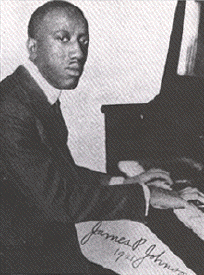This article includes a list of general references, but it lacks sufficient corresponding inline citations. (May 2015) |
James P. Johnson | |
|---|---|
 | |
| Background information | |
| Birth name | James Price Johnson |
| Born | February 1, 1894 New Brunswick, New Jersey, U.S. |
| Died | November 17, 1955 (aged 61) Jamaica, Queens, New York City, U.S. |
| Genres | Jazz |
| Occupation(s) | Composer, musician |
| Instrument | Piano |
| Years active | 1912–1955 |
James Price Johnson (February 1, 1894 – November 17, 1955) was an American pianist and composer. A pioneer of stride piano, he was one of the most important pianists in the early era of recording, and like Jelly Roll Morton, one of the key figures in the evolution of ragtime into what was eventually called jazz.[1] Johnson was a major influence on Count Basie, Duke Ellington, Art Tatum, Thelonious Monk, and Fats Waller, who was his student.[2]
Johnson composed many hit songs, including the unofficial anthem of the Roaring Twenties, "The Charleston", and he remained the acknowledged king of New York jazz pianists through most of the 1930s. Johnson's artistry, influence on early popular music, and contributions to musical theatre are often overlooked, and as such, he has been referred to by musicologist David Schiff as "The Invisible Pianist."[3]
- ^ Porter, Lewis (May 3, 2019). "Deep Dive: Putting Louis Armstrong in Context". Wbgo. Retrieved April 21, 2020.
- ^ "James P. Johnson | American composer and pianist". Encyclopedia Britannica. Retrieved April 21, 2020.
- ^ Schiff, David (February 16, 1992). "POP MUSIC; A Pianist With Harlem on His Mind". The New York Times. Retrieved April 21, 2020.